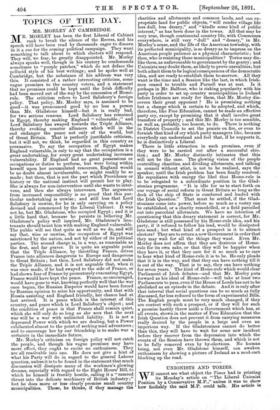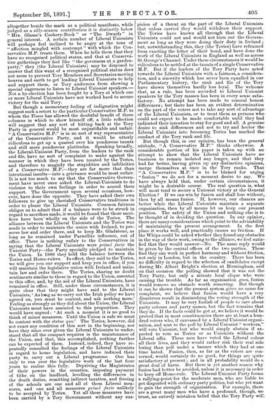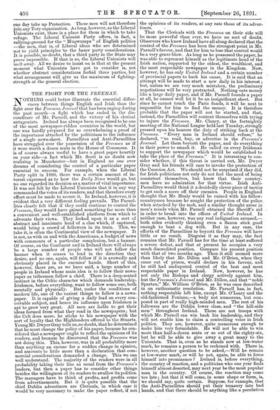UNIONISTS AND TORIES.
WE cannot see what object the Times had in printing its Monday's article on " The Liberal Unionist Position by a Conservative M.P.," unless it was to show how foolishly the said M.P. could talk. His article is altogether beside the mark as a political manifesto, while judged as a silly-season contribution it is distinctly below " Mrs. Glasse's Cookery-Book " or " The Dwarfs " in general interest. A certain number of Liberal Unionists will perhaps feel inclined to be angry at the tone of " affection mingled with contempt " with which the Con- servative M.P. treats them. When he tells them that they have no recognised political status, and that at Conserva- tive gatherings they feel like " the governess at a garden- party," they (the Liberal Unionists) may be disposed to answer that this want of a recognised political status does not seem to prevent Tory Members and Secretaries moving heaven and earth to get leading Liberal Unionists to help and support them, or Tory audiences from showing a special eagerness to listen to Liberal Unionist speakers.— Not a by-election has been fought by a Tory at which one or more Liberal Unionists have not worked hard to secure victory for the said Tory. But though a momentary feeling of indignation might suggest such a retort to the particular Conservative M.P. to whom the Times has allowed the doubtful benefit of three columns in which to show himself off, a little reflection will suggest that any sort of hitting back at the Tory Party in general would be most unjustifiable and unfair. " A Conservative M.P." is in no sort of way representative of the Conservative Party, and it would be utterly ridiculous to get up a quarrel over his ponderous taunts and still more ponderous platitudes. Speaking broadly, the Liberal-Unionist Party, from the leaders to the rank and file, have no sort of complaint to make against the manner in which they have been treated by the Tories, and therefore to magnify the stupidities and infelicities of a Conservative M.P.—they are far more that than intentional insults—into a grievance would be most unfair. It is not too much to say that the Conservative Govern- ment have never once asked the Liberal-Unionists to do violence to their own feelings in order to accord them support. The Government upon several occasions, how- ever, have done the opposite. They have asked their own followers to give up cherished Conservative traditions in order to please the Liberal Unionists. Common fairness obliges us to admit that if a balance were to be struck in regard to sacrifices made, it would be found that these sacri- fices have been wholly on the side of the Tories. The alliance between the Liberal Unionists and the Tories was made in order to maintain the union with Ireland, to pre- serve law and order there, and to keep Mr. Gladstone, as long as he remained under Parnellite influence, out of office. There is nothing unfair to the Conservatives in saying that' the Liberal Unionists were prima facie the Unionist Party—the Party specially pledged to maintain the Union. In 1886 they held the balance between the Tories and Home-rulers. In effect, they said to the Tories, we will give you our support and keep you in office, if you will maintain the legislative union with Ireland and main- tain law and order there. The Tories, sharing no doubt sentiments similar to these in regard to the Union, assented to this offer, and, by the aid of the Liberal Unionists, have remained in office. Still, under these circumstances, it is quite clear that they might have said to the Liberal Unionists, As long as we carry out the Irish policy we have agreed on, you must be content, and ask nothing more.' Feeling as strongly as they did about the Union, the Liberal Unionists must have assented to this proposition. They would have argued : ' At such a moment it is no good to think of minor measures. Until the Union is safe we must be content with the status quo.' The Tories, however, did not exact any condition of this sort in the beginning, nor have they since ever given the Liberal Unionists to under- stand that all the compact requires is the maintenance of the Union, and that, this accomplished, nothing further can be expected of them. Instead, indeed, they have re- peatedly consulted the feelings of the Liberal Unionists in regard to home legislation, and have induced their party to. carry out a Liberal programme. One has only to run over the• legislative work of the last four years to realise this fully. Depriving the Magistrates of their powers in the counties, imposing payment of tithe on the landlord, levelling the differences in the death duties, remitting indirect taxation, and freeing of the schools are one and all of them Liberal mea- sures, and one and all measures primci fade unlikely to be accepted by Tories. Yet all these measures have been carried by a Tory Government without any sus- picion of a threat on the part of the Liberal Unionists that unless carried they would withdraw their support.. The Tories have known all through that the Liberal Unionists could not and would not turn out the Govern- ment as long as they were doing their duty in Ireland ; but, notwithstanding this, they (the Tories) have refrained from exacting the letter of their bond, and have done the work of the Liberal Unionists in England as well as across St. George's Channel. Under these circumstances it would be ridiculous to be nettled at the taunts of a single Conservative M.P. But if the leaders of the Tory Party have acted- towards the Liberal Unionists with a fairness, a considera-- tion, and a sincerity which has never been equalled in our Parliamentary history, the rank and file of the Tory have shown themselves hardly less loyal. The welcome that, as a rule, has been accorded to Liberal Unionist speakers by the Tory masses has been in every sense satis- factory. No attempt has been made to conceal honest differences ; but there has been an evident determination on the part of the voters not to take any sort of advantage- of the Liberal Unionists, or to treat them as persons who- could not expect to be made comfortable until they had- indicated their intention to stay for good and all. A genuine desire to sink differences and not to try and hector the• Liberal Unionists into becoming Tories has marked the• conduct of the Tory rank and file.
But though this, in our opinion, has been the general attitude, "A Conservative M.P." thinks otherwise. A considerable portion of his paper is taken up with au- attempt to show that the Liberal Unionists have no business to remain isolated any longer, and that they had far better, having given up any distinctive opinions, merge themselves at once in the Tory ranks. That- " A Conservative M.P." is to be blamed for urging " fusion " we do not for a moment desire to say. We have always held that, under certain circumstances, it might be a desirable course. The real question is, what will most tend to secure a Unionist victory at the General Eledtion ? If we can win by fusion and shall lose without, then by all means fusion. If, however, our chances are better while the Liberal Unionists maintain a separate organisation, then by all means let us keep our present position. The safety of the Union and nothing else is to be thought of in deciding the question. In our opinior, there are many considerations which point to the advisability of maintaining the present arrangement. In the first place it works well, and practically causes no friction. If the Whips could be asked whether they found any obstacles in the way of their work, owing to the alliance, we feel satis- fied that they would answer—No. The same reply would be given by the central offices of the two parties. These- find they can work in perfect harmony and without friction, not only in London, but in the country. There has been no difficulty in regard to the selection of candidates except during Mr. Albert Bright's election at Birmingham, and on that occasion the polling showed that it was not the Tory Party, but only a minute local clique who were causing the trouble. As far as organisation goes, fusion, would remove no obstacle worth removing. But though it can be shown that the present system gives no cause for complaint, we believe that fusion would have a very disastrous result in diminishing the voting strength of the Unionists. It may be very foolish of people to care about - party colours and party names, but the fact remains that they do. If the facts could be got at, we believe it would be proved that in most constituencies there are at least a hun- dred voters who, if canvassed by a Liberal Unionist organi- sation, and sent to the poll by Liberal Unionist " workers," ' will vote Unionist, but who would simply abstain if ex- pected to vote as Tories or as Unionists without the Liberal affix. These men have voted the Liberal colour all their lives, and they would rather risk their real side losing than poll under a banner which they had at one time hated. Fusion, then, as far as the voters are con- cerned, would certainly do no good, for things are quite satisfactory at present ; and in all probability would do a great deal of harm. But there is yet another reason why fusion had better be avoided, unless it is necessary in order to keep off Home-rule. The Liberal Unionist Party forms a rallying-point for the moderate men, who are liable to get disgusted with ordinary party politics, but who yet want- to gain the strength of organisation. For example, there are a great many men •who have a profound, though, we trust, an entirely mistaken belief that the Tory Party wilt ene day take up Protection. These men will not therefore join any Tory organisation. As long, however, as the Liberal Unionists exist, there is a place for them in which to take refuge. The Liberal Unionist Party offers, in fact, a rallying-ground for the " Mugwumps ' of English politics —the men, that is, of Liberal ideas who are determined • not to yield principles 'to the baser party considerations. It is possible, no doubt, that a third party in the State may prove impossible. If that is so, the Liberal Unionists will melt away. All we desire to insist on is that at the resent moment what Unionists have got to consider is, not whether abstract considerations forbid three parties, but what arrangement will give us the maximum of fighting- strength at the generkl election.




































 Previous page
Previous page